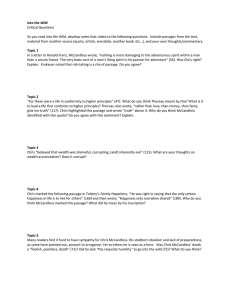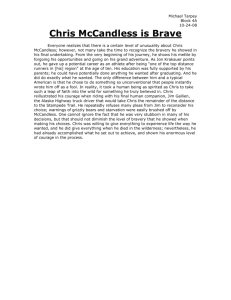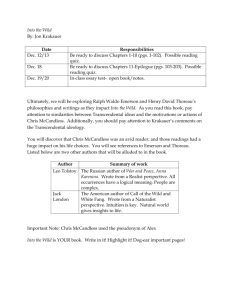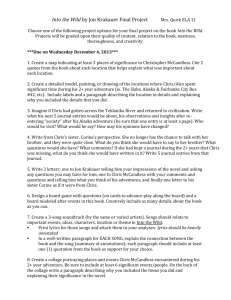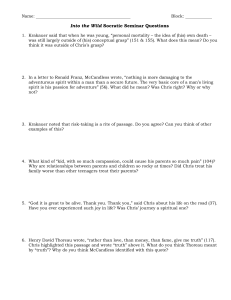Socratic questions
advertisement
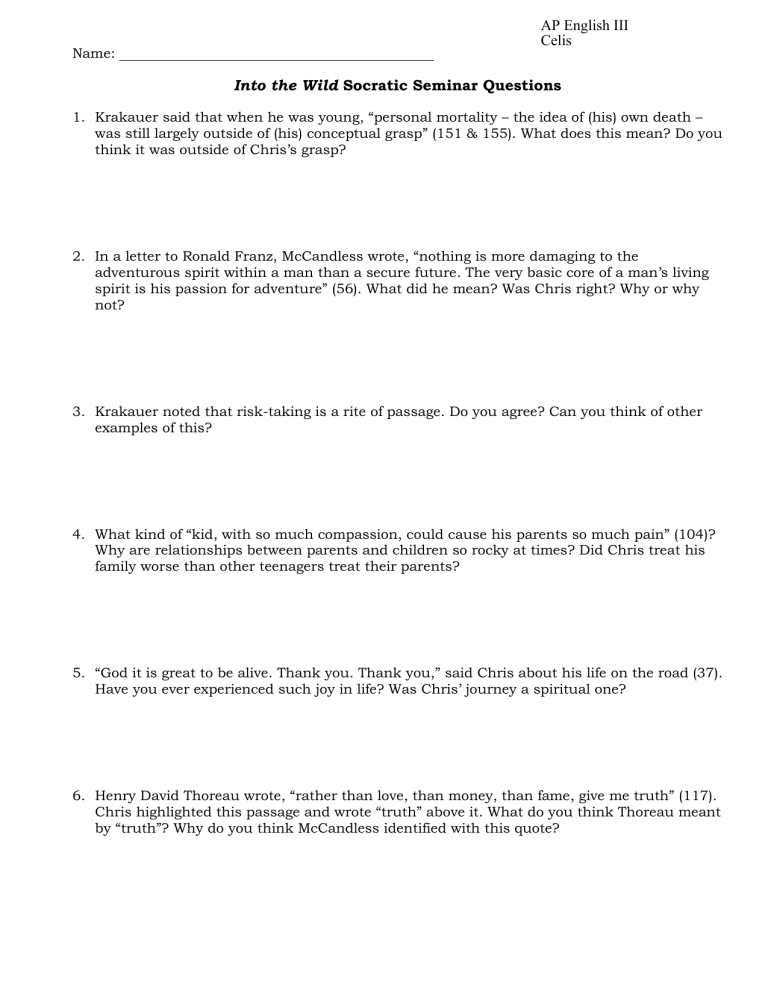
Name: AP English III Celis Into the Wild Socratic Seminar Questions 1. Krakauer said that when he was young, “personal mortality – the idea of (his) own death – was still largely outside of (his) conceptual grasp” (151 & 155). What does this mean? Do you think it was outside of Chris’s grasp? 2. In a letter to Ronald Franz, McCandless wrote, “nothing is more damaging to the adventurous spirit within a man than a secure future. The very basic core of a man’s living spirit is his passion for adventure” (56). What did he mean? Was Chris right? Why or why not? 3. Krakauer noted that risk-taking is a rite of passage. Do you agree? Can you think of other examples of this? 4. What kind of “kid, with so much compassion, could cause his parents so much pain” (104)? Why are relationships between parents and children so rocky at times? Did Chris treat his family worse than other teenagers treat their parents? 5. “God it is great to be alive. Thank you. Thank you,” said Chris about his life on the road (37). Have you ever experienced such joy in life? Was Chris’ journey a spiritual one? 6. Henry David Thoreau wrote, “rather than love, than money, than fame, give me truth” (117). Chris highlighted this passage and wrote “truth” above it. What do you think Thoreau meant by “truth”? Why do you think McCandless identified with this quote? 7. “Alaska has long been a magnet for dreamers and misfits, people who think the unsullied enormity of the last frontier will patch all of the holes in their lives” (4). What are the holes people are trying to fill? Why do we believe the frontier will save us? 8. About a half-mile downstream the Teklanika River from where Chris tried to ford it, there is a gauging station with a steel cable and basket. Jon Krakauer used a detailed map to find this gauging station and cross the river. If Chris had had a map, he too could have crossed the river safely. Why did he refuse to take a map? 9. One reader of Krakauer’s Outside article claimed that Chris “lacked the requisite humility” to go into the wild and that he “commits big-time hubris” (72). Look up the words humility and hubris in a dictionary. What does the reader mean by this? Explain why you agree or disagree. 10. Chris marked the following passage in Tolstoy’s Family Happiness, “He was right in saying that the only certain happiness in life is to live for others” (169) and then wrote, “Happiness only real when shared” (189). Why do you think McCandless marked this passage? What did he mean by his inscription? 11. On August 18, 1992, Chris passed away. Krakauer notes that, “one of his last acts was to take a picture of himself, standing near the bus under the high Alaska sky, one hand holding his final note toward the camera lens, the other raised in a brave, beatific farewell. His face is horribly emaciated, almost skeletal. But if he pitied himself in those last difficult hours, because he was so young, because he was alone, because his body had betrayed him and his will had let him down-it’s not apparent from the photograph. He is smiling in the picture, and there is no mistaking the look in his eyes: Chris McCandless was at peace, serene as a monk gone to God” (199). Do you think Chris died at peace? 12. What are your impressions of Chris? Was he noble? Reckless? Selfish? Courageous? A pilgrim (85)?
